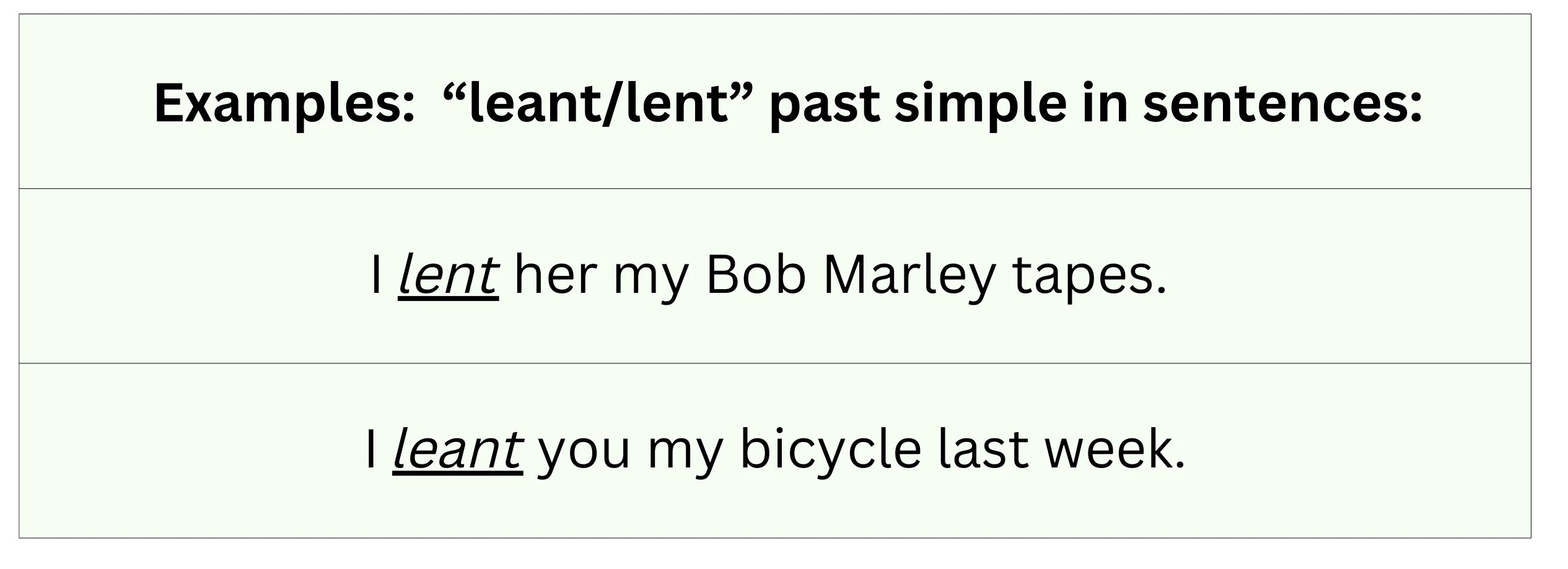
“Lend” vs. “lent”

My brother lent me his bicycle for the afternoon.
We have lent our textbooks to several classmates this semester.
She lended me her notes from the lecture.
The library had lended out all the copies of that book.
The past tense of lend is lent. Lent is the only past tense form of the present tense verb, lend. Lended is not an official word, and now you can avoid using it.
That being said, should you hear lended in conversation, it’s your decision whether to correct them—though, most people don’t appreciate being corrected in their grammar (even if they are demonstrably wrong).
Once you’ve read up on lent and all the ways it can be employed, you’ll be well-equipped to lend yourself to a nice grammar lesson! (Or you may keep the information to yourself, lest your lesson lend itself to hurt feelings.)
Forms of “lend”
The verb lend is defined in the dictionary as “to give for temporary use on condition that the same or its equivalent be returned,” or “to be put at another’s temporary disposal.” See the verb lend in action in sentences:
| present | past | future | |
| simple | I lend | I lent | I will lend |
| continuous | I am lending | I was lending | I will be lending |
| perfect | I have lent | I had lent | I will have lent |
| perfect continuous | I have been lending | I had been lending | I will have been lending |
To lend is in the present tense: The bank wouldn’t lend us the money.
Lent is the simple past: I lent our ladder to the neighbours.
Lent is also the past participle: I had lent him the money before the offer closed.
See the following chart of other irregular verbs with two forms, like lend/lent:
| base verb | past tense | past participle |
| lean | leant/leaned | leant/leaned |
| leap | leapt/leaped | leapt/leaped |
| learn | learnt/learned | learnt/learned |
| lend | leant | leant |
| bend | bent | bent |
| deal | dealt | dealt |
What’s the past tense of lend? Lended, lend or lent?
The past tense of lend is lent—not lended. Because lend is an irregular verb, its past tense form does not end in –ed. Like the simple past tense form, the past participle form of lend is also lent. As a past participle, lent may be used in a number of ways: as an adjective, in a participle phrase, or with an auxiliary verb to form the past perfect tense.
A participle phrase acts like an adjective, only with a few more words. It is a sentence that contains a participle and serves to describe a noun. The past perfect tense describes the order in which events took place in the past. To form the past perfect of lend, pair the past participle form lent with an auxiliary verb, such as had: ‘she had lent me the money the moment I requested it.’
Compare the following sentences:
1. I lent you my stand mixer.
2. She had to be careful— she didn’t want to dirty her lent sneakers.
3. Lent to my brother, my binoculars were used much more frequently.
4. He had lent the neighbour his snow shovel, so she made him hot cocoa in return.
5. Michael’s cards were lent to Joanne for the weekend.
Examples of the verb lend in context
1. Don’t worry, I’ll lend you my gloves.
2. We lend our driveway to concert-goers when the parking lot is full.
3. Lend me a hand, will you?
4. He thinks lending money is a bad idea.
5. They lend with such high interest rates— why would anyone ever want to borrow from them?
That the past tense of “lend” is “lent,” associate “lent” with the past tense of “spend”—both end in “-ent” and describe giving something away.
Examples of the word lent in context
1. She lent me an ear when I needed someone to talk to.
2. I had lent you my umbrella that day, so I was drenched by the time I got home.
3. He lent me the keys to his truck.
4. Just a few days after he had lent me his truck, it was totalled.
5. They lent her a pair of skates.
Synonyms of lend/lent
- loan
- advance
- supply
- grant
- impart
Origin of the verb lend
From etymology online on lend (v.):
“Grant temporary possession of,” late 14c., from past tense of Old English lænan “to grant temporarily, lease out, make loans, lend money at interest,” from Proto-Germanic laihwnjan, verb derived from loikw-nes-, the prehistoric source of Old English læn “gift” (see loan (n.)). Compare Dutch lenen, Old High German lehanon, German lehnen, all verbs derived from nouns. In Middle English the past tense form, with terminal -d, became the principal form on analogy of bend, send, etc. To lend an ear “listen” is from late 14c.
Other commonly confused verb tenses
- What’s the past tense of spread?
- What’s the past tense of lead?
- What’s the past tense of choose?
- What’s the past tense of fly?
- What’s the past tense of lay?
- What’s the past tense of drive?
- What’s the past tense of draw?
Learn more about grammar
- What are regular and irregular verbs?
- Transitive and intransitive verbs?
- What are verbs?
- What’re personal pronouns?
- What’s the difference between they’re, their, and there?
- Whose vs who’s?
Work Sheet
What is the correct simple past tense of the verb “lend”?
Which form of “lend” is used as the past participle?
Why is “lended” considered incorrect as the past tense or past participle?
In the sentence, “I have lent him the money before the offer closed,” what tense is “lent” used to form?
Which sentence uses the past tense or past participle of “lend” correctly?
I our ladder to the neighbours last week.
We have our textbooks to several classmates this semester.
The bank wouldn’t us the money for the project.
By the time I asked, he had already his tools to someone else.
I the book to her yesterday, so she should have it now.
Frequently Asked Questions
What is the past tense of lend?
+
Is lended a correct past tense form?
+
How do I use lent as a past participle?
+
Give example of lent in a sentence.
+
Why is lend an irregular verb?
+
Yash, D. "What’s the Past Tense of Lend? Lent, Lend or Lended?." Grammarflex, Jun 7, 2025, https://www.grammarflex.com/is-it-lent-lend-or-lended-whats-the-past-tense-of-lend/.
Sources
-
Merriam-Webster, definition of lend.











